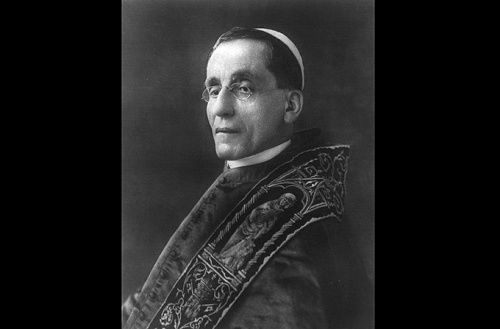Despite a biography title labeling him the “Unknown Pope,” Benedict XV had a tremendous impact on life of the Church, and his legacy of diplomacy and efforts for peace live on today. On Sept. 3, 1914 — 100 years ago today — Giacomo Giambattista della Chiesa was elected Bishop of Rome. della Chiesa, a longtime diplomat who had been Archbishop of Bologna since 1907, took the name Benedict XV when he was elected a little more than a month after the outbreak of World War I. While his efforts for peace in the midst of the Great War were pivotal in his pontificate, his impact cannot be limited to those peace efforts. Having been elected shortly after the beginning of World War I, Benedict XV put into action a strong commitment to peace with strongly worded messages to the nations at war. Of his 13 encyclicals, five concerned peace, as did two of his three apostolic exhortations. The tradition of papal adherence to non-violence had begun under Bl. Pius IX, who had promoted a culture of peace. Bl. Pius' successor, Leo XIII, then made a proposal for peace at a conference on disarmament in which took part at The Hague on May 18, 1899. On that occasion, some of the 26 nations taking part in the conference acknowledged the Pope as a mediator in conflicts because of his “universal paternity.” Benedict XV continued the commitment to peace of his predecessors, and developed the Church’s doctrine on just war. della Chiesa understood that new arms would overshadow the difference between combatants and non-combatants, and immediately opposed the Great War. On Aug. 1, 1917, he issued a peace plan in which he defined war as “useless massacre.” Despite his constant efforts to avert the war, his voice was ignored by belligerent countries and the Holy See was not invited to take part to the peace conference held at Versailles in 1918. Benedict XV understood that the Holy See had to improve its diplomatic efforts: at the beginning of the war, the Holy See had diplomatic relations with only the Austro-Hungarian and Russian empires — both of which collapsed during the world war. After the war, the network of Vatican relations increased, and Benedict XV formed the basis of the modern network of nunciatures. His biographer John Pollard stressed that “by the time Benedict died in 1922, the Vatican had relations with nearly all of the great powers, including Germany, except America and the USSR.” The experience of First World War increased the Holy See's desire to separate from the Italian state, and this is the reason why the Holy See do not accept residential ambassadors who represent state's with Italy as well as with the Holy See. During the First World War, in fact, there was only one national embassy in Rome. When both Austria and Germany — then at war with Italy — withdrew their diplomatic representation, the Holy See found itself without German or Austrian interlocutors. The Holy See objected to ambassadors being withdrawn because while Italy might have been at war with Austria and Germany, the Holy See was not. Together with his diplomatic action, Benedict XV carried forward a huge humanitarian effort during the war. He was the patron of “The Work of Prisoners,” a group who aided prisoners of war. The Pope spent some 82 million lire of the time — roughly 8 billion dollars today — on the effort. The group made some 700,000 requests for information about prisoners; 40,000 requests for repatriation; and 500,000 communications to the families of prisoners. Priests, apostolic nuncios and bishops also visited prisoner camps on the Pope's behalf. This effort is at the basis of the Holy See's humanitarian effort, which recently led Pope Francis to appoint Cardinal Fernando Filoni as his personal envoy to Iraq. Beyond his diplomatic and humanitarian activity, Benedict XV also issued the 1917 Code of Canon Law, the first time that canon law had been codified. He was honored when Joseph Ratzinger was elected Bishop of Rome in 2005, and took his name, as Benedict XVI. At his first General Audience address, held April 27, 2005, Ratzinger noted that “I wanted to be called Benedict XVI in order to create a spiritual bond with Benedict XV, who steered the Church through the period of turmoil caused by the First World War. He was a courageous and authentic prophet of peace and strove with brave courage first of all to avert the tragedy of the war and then to limit its harmful consequences.” “Treading in his footsteps, I would like to place my ministry at the service of reconciliation and harmony between persons and peoples, since I am profoundly convinced that the great good of peace is first and foremost a gift of God, a precious but unfortunately fragile gift to pray for, safeguard and build up, day after day, with the help of all.” Benedict XV's many efforts at peace, diplomacy, and organizing ecclesial life demonstrate that though he is largely unknown, he has had a tremendous impact on the Church since his pontificate.

